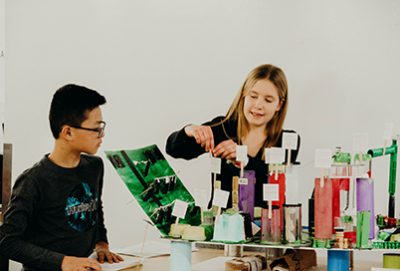January 23, 2020
 by Dr. Bill Hudson, Head of School
by Dr. Bill Hudson, Head of School
A January 14 article published in the Washington Post reported on a study from Georgetown University’s Center on Education and the Workforce that found that “over the course of a career, a liberal arts education is remarkably practical, providing a median return on investment 40 years after graduation that approaches $1 million.” With the rising cost of college, it is right that parents consider the return on their investment, particularly when there seems to be a prevailing bias towards STEM, often at the detriment of the humanities or liberal arts. But the return on investment of a truly exceptional education cannot be limited only to a paycheck.
I have several books stacked on my bookshelves at home and in my office as well as on night table that are half-read. My Audible account has a cue of books I am making my way through and I’ve recently been introduced to a great app called “Blinkist” that summarizes nonfiction books in short, digestible audiocasts. My thirst for news and current events is satiated by another app, “Flipboard,” that I consume alongside my oatmeal and coffee in the morning. My thinking these days has been highly influenced by two books in particular, “Range” by David Epstein and “The Infinite Game” by Simon Sinek.
Both Epstein and Sinek write about a similar concept both believe are necessary to understand ourselves and our world. Epstein presents a concept of “kind” and “wicked” learning environments. His choice of words doesn’t have a moral or ethical denotation but rather describe the presence or absence of predictability. Kind learning environments are predictable in that we know the rules and answers, and they don’t change over time—like chess, golf, and playing classical music. Wicked learning environments have ill-defined challenges and few rigid rules. Likewise, Sinek draws a distinction between finite and infinite games. Finite games have fixed rules while infinite games have very broad boundaries or conventions. In an infinite game, players come and go, there are no defined endpoints, and there is no such thing as winning.
As I think about the underlying pedagogy of MPA, I believe we are fostering a mindset that is comfortable within wicked learning environments and adept at playing an infinite game. We strive to pass on essential knowledge and content as well as cultivate the ability to apply that knowledge to new and emerging problems. Such a mindset also includes skills such as critical thinking, the ability to appreciate multiple perspectives, the capacity to present and explain ideas effectively, and to think across disciplines. This is exactly what is required to address open-ended, real world problems in business, politics, science, and society.
The recent success enjoyed by members of our eighth grade class in the State Future City competition illustrates my perspective. Embedded in our science curriculum, the Future City project starts with a question—how can we make the world a better place? Middle School students imagine, research, design, and build cities of the future that showcase their solution to a citywide sustainability issue. To navigate the infinite game and wicked environment of clean water, students in eighth grade had to apply math and science concepts to this real-world issue and in doing so:
- develop writing, public speaking, problem solving, and time management skills;
- research and propose solutions to engineering challenges;
- discover different types of engineering and explore careers options;
- learn how their communities work and become better citizens; and
- develop strong time management and project management skills.
(Competing for the first time, MPA students placed fifth and earned Honorable Mention. They also took home the following awards: Best Model, Safe Drinking Water Award, Most Environmentally Friendly Powersource, and Rookie of the Year.)
As I go about my day, I am always thinking about our students at MPA and what they need to not just survive but thrive in today’s world and in the great unknown of their future. I am continually asking myself what kind of educational experience can we provide right now that will empower them to make sense of and navigate the world as we know it today, as well as prepare them for what lies ahead. How can we inspire students to be comfortable with chaos, become sufficiently flexible to embrace change, and thrive in wicked learning environments and infinite games?
I am convinced that an exceptional education, like the one we provide at MPA, cannot not be limited by conventional educational pedagogy or prevailing fads. Our researched-based curriculum and mission-based pedagogy goes beyond what most schools provide. The ROI of an education that includes both the liberal arts and STEM cannot be limited solely to income potential, but also the ability to create a better world.